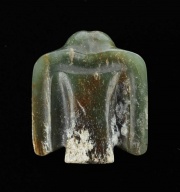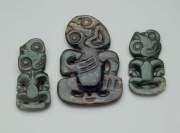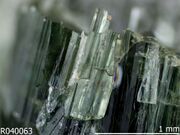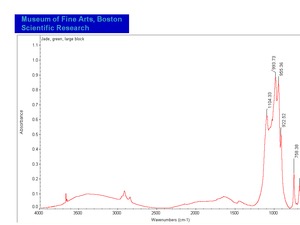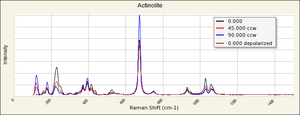Difference between revisions of "Nephrite"
| (6 intermediate revisions by the same user not shown) | |||
| Line 1: | Line 1: | ||
| − | [[File:1994.272-SC130675.jpg|thumb|]] | + | [[File:1994.272-SC130675.jpg|thumb|Bird pendant<br>MFA# 1994.272]] |
== Description == | == Description == | ||
| − | + | [[File:2004.2235-SC131486.jpg|thumb|Maori pendants<br>MFA# 2004.2235]] | |
| − | A hard, dark green stone that is one of two minerals commonly called [[jade]]; the other is [[jadeite]]. Nephrite, a mixture of[[actinolite]] and [[tremolite]], is a calcium magnesium silicate with traces of [[chromium]] and [[nickel]] that produce its color. Nephrite is more opaque and usually darker than jadeite. Sources for nephrite include New Zealand, Australia, Taiwan (nephrite cat's eyes), Turkestan, Korea, Siberia, Mexico, Canada (British Columbia), and the U.S. (Alaska, California, Wyoming). Nephrite has an oily, lustrous appearance when polished. It is sometimes variegated in color and can incorporate white, yellow, brown, gray, and black shades. Nephrite has been used since Neolithic times for small utensils, decorative carvings and jewelry. The greenstone used by the Maoris of New Zealand is nephrite. When heated to about 1025 C, nephrite changes mineral forms to [[diopside]]. | + | A hard, dark green stone that is one of two minerals commonly called [[jade]]; the other is [[jadeite]]. Nephrite, a mixture of [[actinolite]] and [[tremolite]], is a calcium magnesium silicate with traces of [[chromium]] and [[nickel]] that produce its color. Nephrite is more opaque and usually darker than jadeite. Sources for nephrite include New Zealand, Australia, Taiwan (nephrite cat's eyes), Turkestan, Korea, Siberia, Mexico, Canada (British Columbia), and the U.S. (Alaska, California, Wyoming). Nephrite has an oily, lustrous appearance when polished. It is sometimes variegated in color and can incorporate white, yellow, brown, gray, and black shades. Nephrite has been used since Neolithic times for small utensils, decorative carvings and jewelry. The greenstone used by the Maoris of New Zealand is nephrite. When heated to about 1025 C, nephrite changes mineral forms to [[diopside]]. |
| − | + | [[File:Actinolite R040063 Sample Photo 34230 M.jpg|thumb|Actinolite crystals<br>Image credit: [https://rruff.info/actinolite/display=default/R040063 RRUFF]]] | |
| − | [[File: | ||
| − | |||
== Synonyms and Related Terms == | == Synonyms and Related Terms == | ||
jade; nephurite; greenstone, actinolite; tremolite; nefrita (Esp.); néphrite (Fr.); Nephrit (Deut.); nefriet (Ned.) | jade; nephurite; greenstone, actinolite; tremolite; nefrita (Esp.); néphrite (Fr.); Nephrit (Deut.); nefriet (Ned.) | ||
| − | [[[SliderGallery rightalign|Jade, green, large block.TIF~FTIR (MFA)]]] | + | [[[SliderGallery rightalign|Jade, green, large block.TIF~FTIR (MFA)|Actinolite raman RRUFF R040063.png~Raman (RRUFF)]]] |
| − | + | ==Physical and Chemical Properties== | |
| − | == | ||
| − | |||
| − | |||
| − | |||
| − | |||
| − | |||
| − | |||
| − | Fluorescence | + | * Monoclinic system with fibrous or granular crystalline masses |
| − | + | * Cleavage is good in two directions | |
| − | + | * Fracture = splintery to granular | |
| + | * Luster = dull | ||
| + | * Streak = colorless | ||
| + | * Fluorescence = inert | ||
| + | * Pleochroism = none | ||
| + | * Birefringence = usually not detectable | ||
{| class="wikitable" | {| class="wikitable" | ||
| Line 30: | Line 26: | ||
|- | |- | ||
! scope="row"| Mohs Hardness | ! scope="row"| Mohs Hardness | ||
| − | | | + | | 6.0-6.5 |
|- | |- | ||
! scope="row"| Density | ! scope="row"| Density | ||
| − | | 2.9-3.1 | + | | 2.9-3.1 g/ml |
|- | |- | ||
! scope="row"| Refractive Index | ! scope="row"| Refractive Index | ||
| − | | 1. | + | | 1.606-1.632 |
|} | |} | ||
| − | |||
| − | |||
| − | |||
| − | |||
== Comparisons == | == Comparisons == | ||
| Line 47: | Line 39: | ||
[[media:download_file_462.pdf|Properties of Common Gemstones]] | [[media:download_file_462.pdf|Properties of Common Gemstones]] | ||
| − | + | ==Resources and Citations== | |
| − | + | * E.West Fitzhugh, "Jade" ''The Dictionary of Art'', Grove's Dictionaries Inc., New York, 1996. | |
| − | == | + | * Gem Identification Lab Manual, Gemological Institute of America, 2016. |
| − | + | * Mineralogy Database: [http://www.webmineral.com/data/Actinolite.shtml actinolite] | |
* Jack Odgen, ''Jewellery of the Ancient World'', Rizzoli International Publications Inc., New York City, 1982 | * Jack Odgen, ''Jewellery of the Ancient World'', Rizzoli International Publications Inc., New York City, 1982 | ||
| − | |||
* A.Lucas, J.R.Harris, ''Ancient Egyptian Materials and Industries'', Edward Arnold Publishers Ltd., London, 4th edition, 1962 | * A.Lucas, J.R.Harris, ''Ancient Egyptian Materials and Industries'', Edward Arnold Publishers Ltd., London, 4th edition, 1962 | ||
| − | + | * Wikipedia: [https://en.wikipedia.org/wiki/Nephrite Nephrite] (Accessed Nov. 9, 2005 and Dec 2022) | |
| − | |||
| − | |||
| − | * Wikipedia | ||
| − | |||
* Michael O'Donoghue and Louise Joyner, ''Identification of Gemstones'', Butterworth-Heinemann, Oxford, 2003 Comment: Hardness=6.5; RI=1.600-1.641; Specific gravity=2.96-3.02; | * Michael O'Donoghue and Louise Joyner, ''Identification of Gemstones'', Butterworth-Heinemann, Oxford, 2003 Comment: Hardness=6.5; RI=1.600-1.641; Specific gravity=2.96-3.02; | ||
| − | |||
* Ralph Mayer, ''A Dictionary of Art Terms and Techniques'', Harper and Row Publishers, New York, 1969 (also 1945 printing) | * Ralph Mayer, ''A Dictionary of Art Terms and Techniques'', Harper and Row Publishers, New York, 1969 (also 1945 printing) | ||
| − | |||
* C.W.Chesterman, K.E.Lowe, ''Audubon Society Field Guide to North American Rocks and Minerals'', Alfred A. Knopf, New York, 1979 | * C.W.Chesterman, K.E.Lowe, ''Audubon Society Field Guide to North American Rocks and Minerals'', Alfred A. Knopf, New York, 1979 | ||
| − | |||
* G.S.Brady, ''Materials Handbook'', McGraw-Hill Book Co., New York, 1971 Comment: p. 70 | * G.S.Brady, ''Materials Handbook'', McGraw-Hill Book Co., New York, 1971 Comment: p. 70 | ||
| − | |||
* Random House, ''Webster's Encyclopedic Unabridged Dictionary of the English Language'', Grammercy Book, New York, 1997 | * Random House, ''Webster's Encyclopedic Unabridged Dictionary of the English Language'', Grammercy Book, New York, 1997 | ||
| − | |||
* ''The American Heritage Dictionary'' or ''Encarta'', via Microsoft Bookshelf 98, Microsoft Corp., 1998 | * ''The American Heritage Dictionary'' or ''Encarta'', via Microsoft Bookshelf 98, Microsoft Corp., 1998 | ||
| − | + | * Website: http://www.geo.utexas.edu/courses/347k/redesign/gem_notes/Jade/jade_triple_page.htm (fluorescence information) | |
| − | * Website | ||
[[Category:Materials database]] | [[Category:Materials database]] | ||
Latest revision as of 13:56, 28 December 2022
Description
A hard, dark green stone that is one of two minerals commonly called Jade; the other is Jadeite. Nephrite, a mixture of Actinolite and Tremolite, is a calcium magnesium silicate with traces of Chromium and Nickel that produce its color. Nephrite is more opaque and usually darker than jadeite. Sources for nephrite include New Zealand, Australia, Taiwan (nephrite cat's eyes), Turkestan, Korea, Siberia, Mexico, Canada (British Columbia), and the U.S. (Alaska, California, Wyoming). Nephrite has an oily, lustrous appearance when polished. It is sometimes variegated in color and can incorporate white, yellow, brown, gray, and black shades. Nephrite has been used since Neolithic times for small utensils, decorative carvings and jewelry. The greenstone used by the Maoris of New Zealand is nephrite. When heated to about 1025 C, nephrite changes mineral forms to Diopside.
Synonyms and Related Terms
jade; nephurite; greenstone, actinolite; tremolite; nefrita (Esp.); néphrite (Fr.); Nephrit (Deut.); nefriet (Ned.)
Physical and Chemical Properties
- Monoclinic system with fibrous or granular crystalline masses
- Cleavage is good in two directions
- Fracture = splintery to granular
- Luster = dull
- Streak = colorless
- Fluorescence = inert
- Pleochroism = none
- Birefringence = usually not detectable
| Composition | Ca2(MgFe)5Si8O22(OH)2 |
|---|---|
| Mohs Hardness | 6.0-6.5 |
| Density | 2.9-3.1 g/ml |
| Refractive Index | 1.606-1.632 |
Comparisons
Properties of Common Gemstones
Resources and Citations
- E.West Fitzhugh, "Jade" The Dictionary of Art, Grove's Dictionaries Inc., New York, 1996.
- Gem Identification Lab Manual, Gemological Institute of America, 2016.
- Mineralogy Database: actinolite
- Jack Odgen, Jewellery of the Ancient World, Rizzoli International Publications Inc., New York City, 1982
- A.Lucas, J.R.Harris, Ancient Egyptian Materials and Industries, Edward Arnold Publishers Ltd., London, 4th edition, 1962
- Wikipedia: Nephrite (Accessed Nov. 9, 2005 and Dec 2022)
- Michael O'Donoghue and Louise Joyner, Identification of Gemstones, Butterworth-Heinemann, Oxford, 2003 Comment: Hardness=6.5; RI=1.600-1.641; Specific gravity=2.96-3.02;
- Ralph Mayer, A Dictionary of Art Terms and Techniques, Harper and Row Publishers, New York, 1969 (also 1945 printing)
- C.W.Chesterman, K.E.Lowe, Audubon Society Field Guide to North American Rocks and Minerals, Alfred A. Knopf, New York, 1979
- G.S.Brady, Materials Handbook, McGraw-Hill Book Co., New York, 1971 Comment: p. 70
- Random House, Webster's Encyclopedic Unabridged Dictionary of the English Language, Grammercy Book, New York, 1997
- The American Heritage Dictionary or Encarta, via Microsoft Bookshelf 98, Microsoft Corp., 1998
- Website: http://www.geo.utexas.edu/courses/347k/redesign/gem_notes/Jade/jade_triple_page.htm (fluorescence information)
